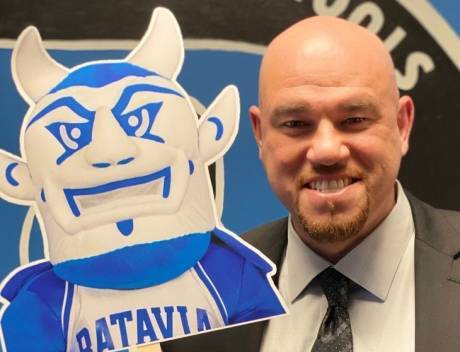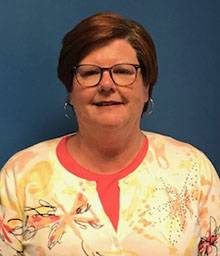Batavia City Council members called out the Batavia City School District over the timing and the focus of the My Brother’s Keeper initiative on Monday night -- following a somewhat strained 25-minute discussion – before approving a resolution to support the program designed to enhance educational and vocational opportunities for boys and young men of color.
“What have we been doing for five years if we knew this and why haven’t we been helping these children five years ago?” asked Council President Eugene Jankowski Jr. during the board’s Conference Meeting at City Hall Council Board Room.
Jankowski was referring to the My Brother’s Keeper program introduced by former President Barack Obama about six years ago.
“If I remember correctly, President Obama brought this to light in 2014-2015 and New York State adopted it in 2016, and now you’re telling me the studies already show that we have youth in our own community that are identified as having concerns or troubles, and they’re not at the same level?” Jankowski said.
“What are we doing in the school system right now to help these kids – persons of color or others that may need it – and why are we waiting a week before the deadline and trying to force this through without public input when we knew about this in 2016 since this grant was out there?”
Jankowski said his concerns centered upon the amount of money the city would be required to support the initiative through mentorships and homework assistance at the Liberty Center for Youth afterschool program and if it was really necessary since the school district is responsible for educating its pupils.
“How did we drop the ball on this especially, although it’s not your concern, (since) I get complaints from people all the time about why their taxes are so high and the school taxes are a major part of it,” he said. “And they’re expecting a service for the children of our community and I’m a little upset that we’ve not done anything for five years for these kids.”
Christian: What About Girls, Other Students?
Prior to Jankowski’s observations, Council Member Rose Mary Christian objected to the program’s targeted focus on boys and young men of color.
“How come girls aren’t included in this and all students?” she asked, directing her query to Julia Rogers, assistant principal at Batavia High School, who was in attendance. “You’re singling out a group.”
Rogers said the program is based on data that shows that students of color – children, young men – do not have the same opportunities as other groups.
“It would be one of those programs that is focused for students of color but a lot of the ideology … for instance, the mentorship – we would be continuing with other students,” she said. “My Brother’s Keeper is a program that is offered through many districts, and basically, it shows a partnership to help these students in Batavia.
"Our numbers in the UPK (Universal Pre-Kindergarten) program are low for students of color. And to work with families from birth to school age to encourage that education and teaching how to educate your children at home. There are a lot of components to that mentorship.”
Rogers said services would be provided throughout students’ school years and could “lead to educational opportunities at the college level and also to business opportunities.”
“So, it’s basically bridging that gap – interagency possibility – for students to have opportunities,” she added.
While acknowledging Christian’s viewpoint, Rogers said that “in reality, those students are the ones who are having difficulties, and there are major gaps for those students.”
“So, what we’re looking for is to have this program and to be able to bridge from it so that our students in all aspects of school … can have a better opportunity.”
Christian wasn’t persuaded, however.
“You’re going to allow anyone to participate because if not, I find it discriminating and it bothers me,” she said. “I’m not a racist person by no means, and this bothers me. So, otherwise, I am going call tomorrow to the Civil Liberties (Union) because I want to make sure that there’s nothing that anyone is denounced in here for any person.”
Tabelski: Municipal Support Required
Interim City Manager Rachael Tabelski proposed the city join forces with the school district in a memo dated Jan. 22, and emphasized that the grant had to be submitted by the end of this month. That’s why it was on the agenda of both the Conference and Special Business meeting that followed last night.
She said that the district obtaining a municipal partner was one of the requirements set forth by the New York State Education Department.
“The program, from my understanding of it … is to support residents of color from birth to graduation of high school to achieve better outcomes through mentorship, through community involvement, through college preparation and all other aspects,” Tabelski said. “It is a targeted program; it’s new for Batavia. I don’t believe we ever had this before and we’re asking that the city sign on and say, ‘Yes, we support this and we think it’s a good idea.’ ”
Tabelski said that the city’s commitment would include advertising on its bulletin boards, introducing students to other community groups they might need to partner with, providing opportunities for students to meet with mentors at the Liberty Center for Youth and providing the homework assistance “that we do at our free afterschool program when it is running at Liberty Center for Youth.”
She also revealed that initial talks about the grant were between the school district and the Genesee County Youth Bureau.
“There was once a conversation with folks from the County Youth Bureau and the youth director. I came in last minute, so forgive me. I’m just trying to help them move this through,” she said. “But originally the plan was to partnership mainly with the county-run programs – the Youth Court and the Youth Leadership program … and to let them know that the city – we do direct programming, we don’t actually run those programs although we participate.”
Tabelski said the agreement was amended to highlight the city’s potential involvement.
“I am the one who suggested that these programs would be something that we would be willing – the City as we move forward, depending on COVID, depending on budget, depending on staffing -- to partner and to allow that center to be a place where the mentors and mentees, and homework can continue to happen.”
Bialkowski: Who Will Provide Homework Help?
Council Member Robert Bialkowski, citing the city’s role in the partnership that includes providing homework assistance, asked who would be providing this service.
Tabelski responded that the city already does this at the Liberty Center for Youth.
“So, whether we contract with the contracting agency in the (proposed) RFP (request for proposal) or we have our own city staff there, it’s already going on. It’s a continuation of what we already are doing,” she said.
Bialkowski then mentioned that city youth services are on hold at this point, and suggested language in the contract that shielded the city from financial obligations if the money wasn’t there.
“We could certainly add that language in there,” Tabelski said, but City Attorney George Van Nest disagreed, saying he didn’t think it was necessary because any private sector agency (or an entity such as a school district) would be subject to any government restrictions in place.
Jankowski said he thought it was “odd” that the school district is the fiscal agent but was asking the city for in-kind support.
Rogers replied that the district already has a “multi-care system approach” to education and mentioned its “great graduation rates.”
“This is another program that we felt would assist us as a school district and as a community to bridge that gap and offer more opportunities to students,” she explained. “It is a program that helps bridge the gap and enhance and cultivate those educational, workforce opportunities for students.”
Jankowski: Why is This Being Pushed Through?
Jankowski noted the school’s budgetary shortfall and, again, questioned why this was “getting pushed through tonight and we haven’t even done our budget yet. We’re voting on this resolution to partner in a grant and these things might not be here.”
Council Member Al McGinnis called it an important issue and encouraged public input before voting to support it.
““We need public input on this. I don’t think we can proceed without having public input, and I’d like the language changed to say all children,” he said.
Again, Jankowski voiced his displeasure with the last-minute notification that put Council on the spot.
“The timing is the problem here,” he said. “We don’t even know what our budget is like. As far as supporting it and moral support … I’m comfortable with that part of it. I don’t know where we’re going to end up from here (with the budget). I don’t what them to apply for that grant and then something comes up beyond our control, and now we’re not able to meet our obligations.”
Council Member John Canale asked Tabelski if there would be any additional cost to the city once the youth center gets up and running. Tabelski said there wouldn’t, prompting Canale to urge his colleagues (Jeremy Karas and Paul Viele were absent) to vote to support it, contingent upon available funding.
That seemed to change Jankowski’s mind as he then commended the program’s priorities and benchmarks, while noting that “people of color” encompasses a larger group of people than just those of African-American descent.
Pacino: If We Can Help, Then Let's Help
Then Council Member Patti Pacino, a longtime educator, spoke in favor of the initiative.
“For all this time, before this came along, we take care of kids who come from families who are Muslim, kids that come from parents who only speak Spanish, kids that come from Black families that have no money. That’s all been going on,” she said. “Now, we can say wait, here’s another program that we can add to our programs.”
“Yes, this one belongs to Black young men that happens to be one where these kids are having problems and these kids are getting into trouble. That does not mean that other kids aren’t. It’s an expansion – one more great thing to do for kids. I’m all for saying we support it and we’ll come up with the money if we can come up with the money. It’s not that we’re taking it over, and it’s not that they haven’t been doing it.”
After Jankowski asked how many students would participate in the program (Rogers said she estimated around 100), Canale said this was an opportunity to “invest in our youth to improve our youth in Batavia -- some of these underprivileged, underserved youth that will stay in Batavia, (and) will be more productive community members as they become adults.”
The resolution was then moved to the Special Business meeting where Christian tried to proposed an amendment to include girls and any students of any color.
That was dismissed, however, due to the parameters of the My Brother’s Keeper initiative.
A vote to support the school district was taken with all Council members except Christian voting in favor of it. McGinnis said he was voting yes, “with reservations.”
In other action, Council:
- Forwarded resolutions concerning the 2021-22 budget ordinance and tax levy; establishment of new water rates, meter fees and capital improvement fees, and amendment of the Batavia Downtown Business Improvement District Plan to its Feb. 8 Business meeting, with expectations that public hearings for all these measures by scheduled for 7 p.m. Feb. 22.
Currently, the budget calls for a 1.38-percent increase in the property tax rate, from $9.59 to $9.73 per $1,000 of taxable assessed value, with a tax levy of $5,864,597.
A budget workshop took place following last night’s Business meeting and another is scheduled for 6 p.m. next Monday.
Water rates and quarterly meter service fees are projected to increase by 3.5 percent, with quarterly capital improvement fees increasing by 10 percent.
Amendments to the BID Plan focus on three capital projects in the pipeline for 2021-22 -- downtown marketing banners ($9,000), downtown music equipment ($30,000) and downtown Christmas decorations ($38,000) – and the amount of the BID’s assessment charge to its members.
- Set a public hearing for 7 p.m. Feb. 8 to apply for a 2020 New York State Community Development Block Grant through the state Office of Homes and Community Renewal. Applications are due by March 5 for public infrastructure, public facilities and planning.
Tabelski said the city is looking at obtaining grant funding for “several infrastructure projects,” specifically mentioning rehabilitative work at the fire station and bureau of maintenance, and a water line project.
- Appointed Lydia Schauf, a former city youth bureau employee, to the City Youth Board advisory group for a term extending through Dec. 31, 2023.



